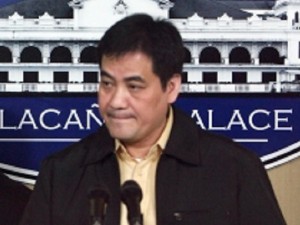Malacañang on Thursday appeared to distance itself from Sen. Antonio Trillanes IV’s alleged statements undermining the government’s position in the territorial dispute between the Philippines and China over Panatag Shoal in the West Philippine Sea.
Palace: Trillanes role was to ease tension, nothing else
On the second day of its attempt to contain damage from the diplomatic controversy, the Palace also told Trillanes, the government’s unofficial negotiator in the talks with China, to shut up until President Benigno Aquino could talk to him.
Role explained
Presidential spokesperson Edwin Lacierda explained to reporters that Trillanes’ role in the backroom talks with China was limited to “de-escalating tensions” caused by a standoff between Philippine and Chinese ships at Panatag Shoal.
Trillanes offered his services to the President for back-channel talks with China as the face-off appeared headed for a long run in April.
The President accepted Trillanes’ offer, but gave him no authority to modify the Philippine stand or commit the country to any deal with China. That was the job of the Department of Foreign Affairs, whose chief, Secretary Albert del Rosario, had already launched the official diplomatic effort to resolve the territorial spat with China.
Senate President Juan Ponce Enrile disclosed on Wednesday that Trillanes had a meeting with Ambassador to China Sonia Brady where he expressed views opposed to the government’s stand on the West Philippine Sea dispute.
From the start of the standoff in early April, the government kept maintaining that Panatag Shoal was within the Philippines’ exclusive economic zone, where the country had complete sovereignty.
Working for Chinese
Speaking on the Senate floor, Enrile accused Trillanes of working for China’s interests all along. He read into the records of Wednesday’s session notes from Brady’s report on her Aug. 17 meeting with Trillanes at which she said the junior senator told her that in the Philippines “no one cares” about Panatag Shoal; that the Chinese wanted the Philippines to tone down its rhetoric against China’s incursion on the shoal; that Trillanes suspected the United States was behind the crisis; and that Del Rosario was “committing treason.”
Brady’s notes, according to Enrile, speaking after a quarrel with Trillanes over a bill that would divide Camarines Sur province, indicated that the junior senator was “protecting the Chinese,” was an “alarmist” who accused Del Rosario of “creating a war event,” and who asked businessman Manuel V. Pangilinan to advise “his friend” Del Rosario to “keep quiet.”
The notes, Enrile said, also showed a Trillanes who believed the Philippines could not enforce coastal protection; took credit for the departure of 40 Chinese ships from Panatag Shoal; and volunteered to become Malacanang’s “direct channel” to Beijing.
Not Palace’s stand
Lacierda said those statements did not echo Malacañang’s stand in the dispute with China.
“It is not the position taken by the President. It is not the position taken by the secretary of foreign affairs,” Lacierda said.
“Our official position is very clear and we have made this position crystal clear actually to the Chinese government through the Chinese Embassy,” he added.
Defense Secretary Voltaire Gazmin said Trillanes’ claim that his intercession had helped to clear Panatag Shoal of Chinese vessels was wrong.
“As far as I know, there are two Chinese maritime ships and one fisheries law enforcement command [vessel at the shoal],” Gazmin told reporters Thursday.
“As of now they still have ships there and we need to talk so we could fix our relationship,” he said.
Limited role
When pressed if Trillanes was authorized by the President to make the statements that Enrile said the junior senator made to Brady, Lacierda defined the senator’s role and the scope of his work.
“What is the role of Senator Trillanes here? The role of Senator Trillanes was to address the immediate issue of the Scarborough Shoal, nothing else,” Lacierda said, using the international name of Panatag Shoal.
“There was a policy of de-escalation, that is correct. However, beyond that, was he competent to answer those things or make those statements? Those are not statements echoed by this government or the (Department of) Foreign Affairs,” Lacierda said.
Throughout Trillanes’ unofficial work in the negotiations with Chinese officials from May to July, the government stuck to its multilateral approach to solve the dispute, Lacierda said.
That approach is unchanged, he said. The Philippines holds that the West Philippine Sea dispute is a problem that must be dealt with in the Association of Southeast Asian Nations (Asean), where the Philippines and Vietnam are promoting a code of conduct that will prevent rival claims in the sea from erupting into armed confrontations.
Lacierda said the government had not veered away from its position that resources within the West Philippine Sea belonged to the Philippines. “We have sovereign rights over them,” Lacierda said.
Despite the controversy set off by Trillanes’ admission of his unofficial role, Lacierda said relations between Manila and Beijing had become “warmer.”
Lacierda said Malacañang had not seen the Brady notes. He refused to comment on Trillanes’ actions, including the number of his trips to China, saying the Palace would assess the issue and make a statement in due time.
After Trillanes gave interviews to radio and TV stations in defiance of the President’s gag order on him and Del Rosario, Malacañang appealed to him to shut up.
Unnecessary nuisance
The President talked to Del Rosario and texted Trillanes, but has yet to meet them. The President has opted to keep silent on the matter while clearing the matter with Del Rosario and Trillanes who had bickered over their conflicting roles in the negotiations, Lacierda said.
“It was an unnecessary nuisance,” he said, clarifying later in the day that he was referring to Trillanes’ reported tiff with Del Rosario, not Trillanes’ clash with Enrile. With reports from Fe Zamora, Norman Bordadora and Marlon Ramos
Originally posted at 06:52 pm | Thursday, September 20, 2012
